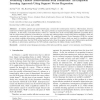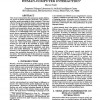643 search results - page 23 / 129 » An Empirical Study of Smoothing Techniques for Language Mode... |
JCST
2008
13 years 7 months ago
2008
In Chinese, phrases and named entities play a central role in information retrieval. Abbreviations, however, make keyword-based approaches less effective. This paper presents an em...
NAACL
1994
13 years 8 months ago
1994
This research characterizes the spontaneous spoken disfluencies typical of human-computer interaction, and presents a predictive model accounting for their occurrence. Data were c...
ANOR
2010
13 years 7 months ago
2010
This paper provides a new framework for the derivation and estimation of consumption and the equity premium functions. The novelty in our approach is that it does not require the ...
UML
2005
Springer
14 years 26 days ago
2005
Springer
Abstract. Aspect-Oriented Modeling (AOM) techniques allow software designers to isolate and address separately solutions for crosscutting concerns (such as security, reliability, n...
QEST
2009
IEEE
14 years 2 months ago
2009
IEEE
—Symmetry reduction is a technique for combating state-space explosion in model checking. The generic representatives approach to symmetry reduction uses a language-level transla...


